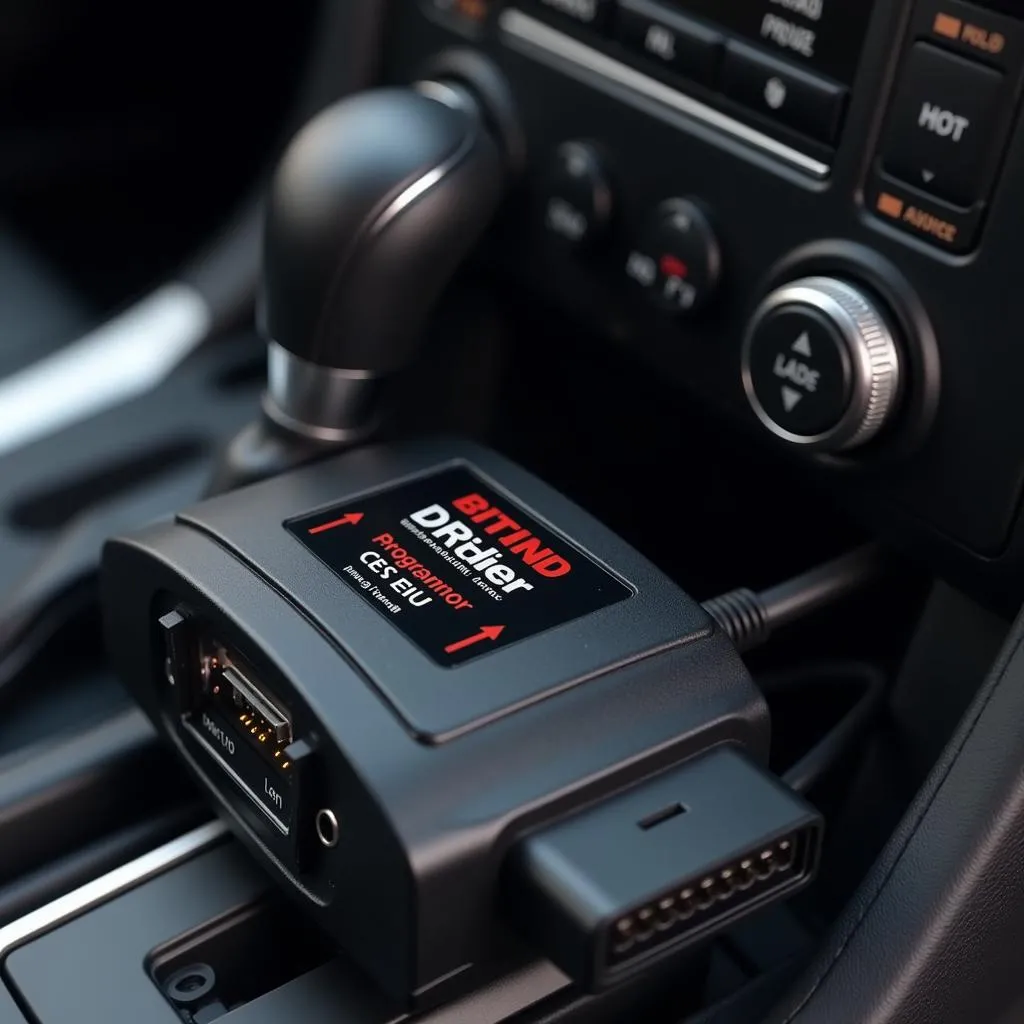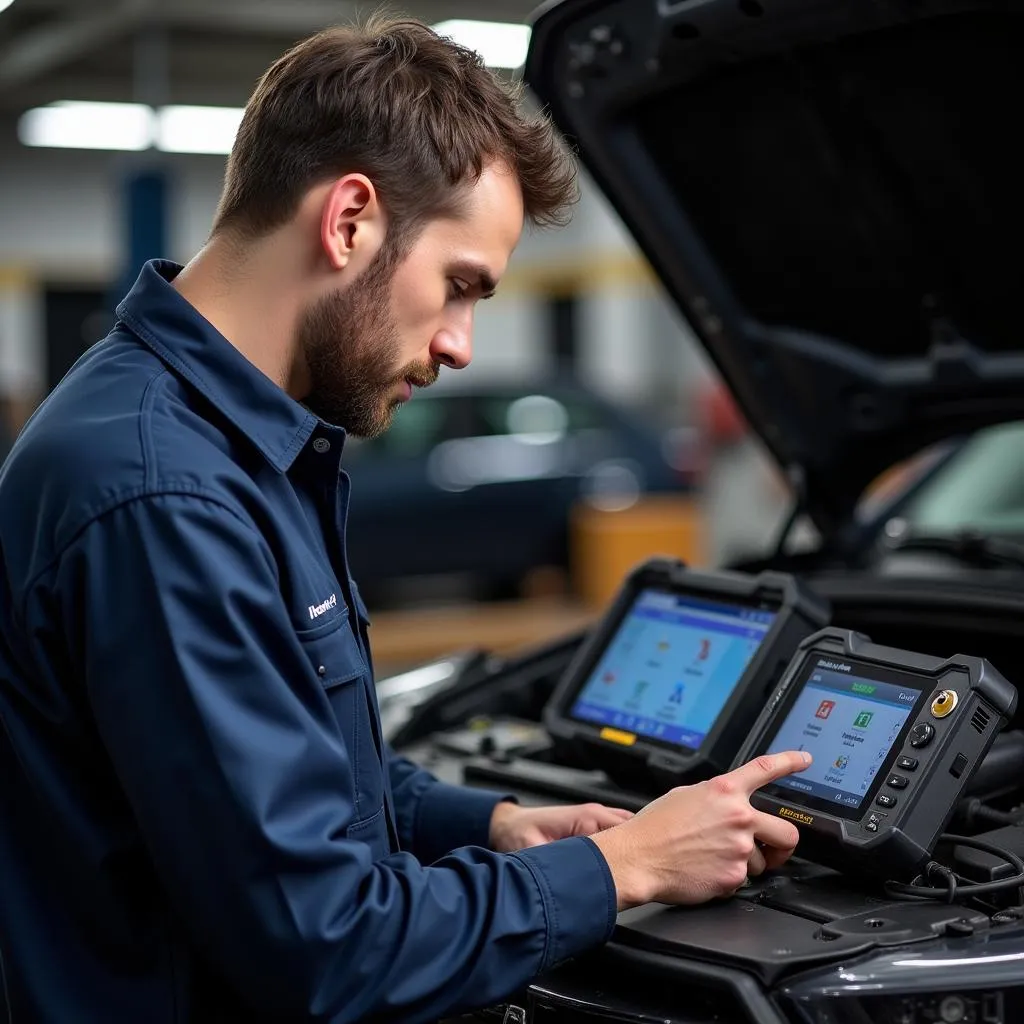An automotive programmer, often called an automotive computer programmer or car programmer, is an essential tool for modern vehicle diagnostics and repair. This sophisticated device allows technicians to communicate with a car’s Engine Control Unit (ECU) to diagnose issues, reprogram modules, and even unlock hidden features. Understanding the intricacies of automotive programmers can be incredibly valuable for both car enthusiasts and professional mechanics.
What Does an Automotive Programmer Do?
At its core, an automotive programmer acts as a bridge between a technician’s diagnostic equipment and the vehicle’s onboard computer systems.
Here are some key functions of an automotive programmer:
- Diagnostics & Troubleshooting: Automotive programmers can read and erase fault codes stored in the ECU, providing crucial information about the vehicle’s health and performance.
- Software Updates & Reprogramming: As car manufacturers release software updates to improve performance, fix bugs, or add new features, an automotive programmer becomes essential for updating the vehicle’s software.
- Module Programming & Configuration: Modern vehicles rely on numerous electronic modules for various functions. An automotive programmer allows technicians to program and configure these modules to ensure seamless operation after replacement or repair.
- Key & Immobilizer Programming: When replacing a lost or damaged key, an automotive programmer is often required to program the new key to the vehicle’s immobilizer system.
- Customization & Performance Tuning: In specific situations, automotive programmers can be used to adjust certain vehicle parameters for performance enhancement or customization, although this should always be done with caution and expertise.
 Automotive programmer connected to car ECU
Automotive programmer connected to car ECU
Types of Automotive Programmers
Automotive programmers come in various forms, each tailored to specific needs and functionalities:
- OEM (Original Equipment Manufacturer) Programmers: These are manufacturer-specific tools designed to work exclusively with a particular car brand. They offer comprehensive functionality but are generally more expensive.
- Aftermarket Programmers: These programmers are produced by third-party companies and often offer compatibility with a wider range of vehicle makes and models. They can be a more cost-effective option for independent workshops.
Choosing the Right Automotive Programmer
Selecting the appropriate automotive programmer depends on several factors:
- Vehicle Compatibility: Ensure the programmer supports the specific makes and models you intend to work on.
- Functionality & Features: Consider the required tasks, whether it’s basic diagnostics, software updates, or advanced module programming.
- Ease of Use: Look for user-friendly interfaces, clear instructions, and reliable software.
- Budget: Set a realistic budget and explore options that offer the best value for money.
 Mechanic using automotive programmer in workshop
Mechanic using automotive programmer in workshop
The Future of Automotive Programming
The automotive industry is undergoing a rapid transformation with the advent of electric vehicles (EVs), autonomous driving technologies, and increasingly sophisticated electronic systems. As a result, the role of automotive scanners and programmers is evolving significantly.
In the future, automotive programmers are expected to:
- Support Advanced Diagnostics: Diagnose and troubleshoot increasingly complex electronic systems in EVs and autonomous vehicles.
- Facilitate Over-the-Air (OTA) Updates: Manage and implement OTA software updates for various vehicle modules.
- Enable Customization & Personalization: Offer more options for vehicle personalization and feature customization.
Conclusion
The automotive programmer is an indispensable tool in the modern automotive landscape. As vehicles become increasingly reliant on software and electronics, the demand for skilled technicians equipped with advanced programming knowledge will continue to rise. By understanding the capabilities and limitations of automotive programmers, car owners and professionals alike can make informed decisions about vehicle maintenance, repair, and even customization.
FAQs
1. Do I need an automotive programmer for basic car maintenance?
Basic car maintenance tasks like oil changes and tire rotations typically don’t require an automotive programmer. However, for more complex diagnostics, software updates, or module replacements, a programmer is often essential.
2. Can I use an automotive programmer to tune my car for better performance?
While some automotive programmers offer performance tuning capabilities, it’s crucial to proceed with caution. Modifying engine parameters without proper expertise can potentially damage your vehicle or void its warranty. Consult with a qualified mechanic or tuning specialist for safe and reliable performance enhancements.
3. Are automotive programmers universal, or do I need a specific one for my car brand?
Automotive programmers can be either manufacturer-specific (OEM) or aftermarket, offering varying degrees of compatibility. Ensure the programmer you choose supports your vehicle’s make and model before purchasing.
4. How often do I need to update my car’s software?
Software update frequency varies depending on the car manufacturer and the specific system. It’s recommended to consult your owner’s manual or contact your dealership for information on available updates and the recommended update schedule.
5. Can I damage my car by using an automotive programmer incorrectly?
While automotive programmers are generally safe to use, improper operation can potentially cause software conflicts or damage to vehicle systems. It’s crucial to follow instructions carefully, use the correct software versions, and consult reputable sources for guidance.
Still have questions?
Contact our dedicated support team via WhatsApp: +1(641)206-8880, Email: [email protected]. Or visit us at 276 Reock St, City of Orange, NJ 07050, United States. We are available 24/7 to assist you.